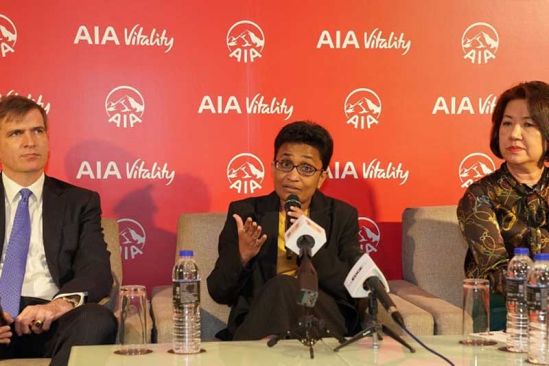AIA Bhd. revealed the results of the Malaysia’s Healthiest Workplace by AIA Vitality 2018 survey has found an increasing prevalence of mental health issues in the workplace with 50.2 per cent of employees having reported at least one dimension of work-related stress.
The findings demonstrate that Malaysia continues to be affected by productivity loss in the workplace that is attributed to significant absence and presenteeism in its workforce.
Absence refers to employees’ absence from work due to health problems while presenteeism means employees are present at work but are constrained by health problems to carry out their daily activities.
Additionally, the loss of working days increased from an average of 67.2 days from last year which translates into an estimated cost of RM2.27 million lost per organisation per year.
Among the many survey revelations, mental health remains one of the biggest but least talked about issue in the workplace.
Often, mental health is largely ignored and undetected due to stigma and a lack of understanding and about with 18.2 per cent attribute their stress to financial concerns.
Malaysian employees have also become increasingly affected by mental issues over the years which can lead to staff absences and turnover which in turn negatively impact the productivity and performance of the company.
If not addressed, both employers and employees are at the losing end with the performances of employees and employers affected.
“We launched Malaysia’s Healthiest Workplace by AIA Vitality as the first step towards creating awareness and promoting workplace wellness to help Malaysia’s workforce live healthier, longer, and better lives.
“We are proud to lead the discussion on this topic for the second year running, and truly hope that these insights and strategies from the survey will help corporates understand, strategise and implement interventions which can affect positive behavioural change among their employees,” says AIA Bhd Chief Executive Officer Anusha Thavarajah.
As the leading provider of employee benefits schemes in Malaysia, AIA has a first-hand view of the impact that an unhealthy workforce has on employers.
Through this initiative, AIA continues to play a role that moves beyond just protecting and insuring people, but evolving into one that helps people to stay healthy.
“This year, we especially wanted to tackle a difficult topic – mental health. With work place stress being one of the main workforce risks, we felt that it was important for us to spur conversations on this controversial subject.
“There is a clear need for Corporate Malaysia to build a culture within our organisations that provide a safe workplace environment that encourages disclosure and healing without judgment.
“It is our hope that this initiative we have embarked is only just the beginning of a healthier workplace and work culture for all Malaysians,” Anusha added.
The survey also revealed that Malaysian employees are seen to have poor habits as the number of smokers have increased in comparison to other markets (namely Australia, Hong Kong and Thailand) – 11.1 per cent of employees are currently smokers, compared to the average of 7.5 per cent in other markets.
They are recorded as being most at risk for nutrition with 91.7 per cent not eating a balanced diet that includes fruits, vegetables, and whole grains.
Additionally, 16.6 per cent of Malaysian employees surveyed are obese. Stress, binge eating, or being overwhelmed at work can be contributing factors to the rise of these poor habits.
The Malaysia’s Healthiest Workplace survey is an independent survey commissioned by AIA and delivered in partnership with research agency RAND Europe, and Universiti Kebangsaan Malaysia as the study’s local academic advisor.
Modelled after the Britain’s Healthiest Workplace, a highly successful study which has been carried out in the UK since 2013, it is currently the only comprehensive science-backed workplace survey ever conducted in Malaysia.
The survey is offered free of charge to Malaysian companies with a minimum 20 staff force, and in return for participating, the companies will receive a detailed organisational health report which helps them understand the risk factor amongst their employees, as well as the effectiveness of their health and wellness interventions.







